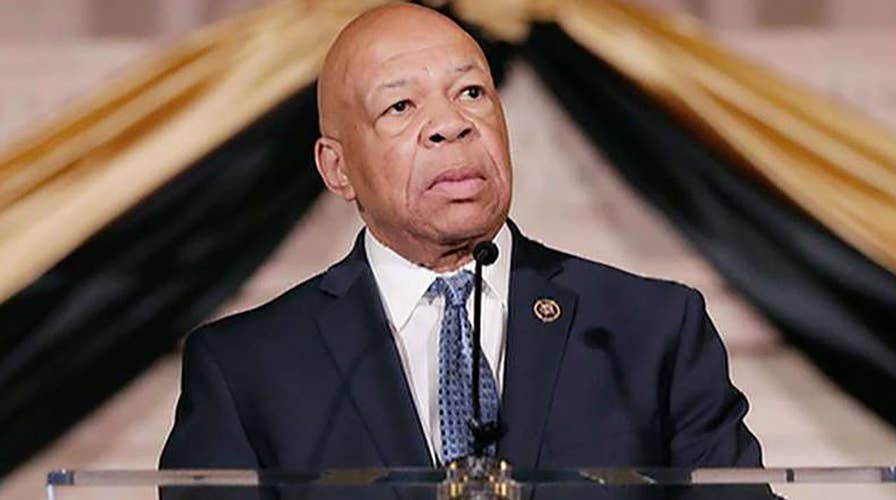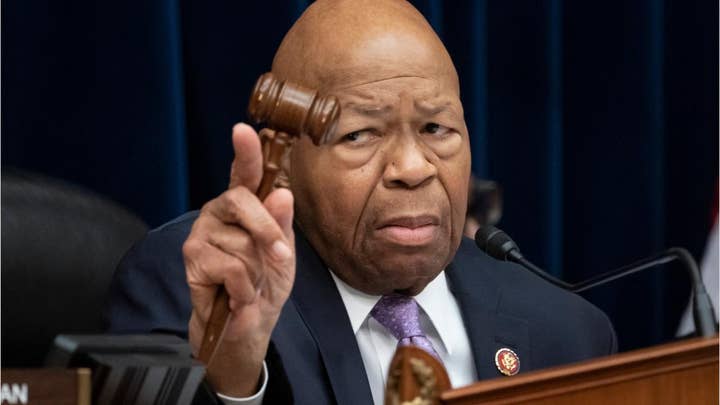Death of Rep. Elijah Cummings draws bipartisan tributes
Reaction pours in from Capitol Hill and beyond after the death of Maryland Democrat Rep. Elijah Cummings; Griff Jenkins reports from Baltimore.
This story is adapted from a 2015 FoxNews.com article and updated in light of Cummings’ death on Thursday.
In early May 2015, Rep. Elijah Cummings, D-Md., lumbered through the subway station deep in the bowels of the Rayburn House Office Building, a portfolio tucked under his left arm.
The time for a roll call vote on the floor of the House - all the way over at the Capitol - had long since expired. But the vote remained open and Cummings was running late. The train initially lurched forward, departing from the Rayburn station with just two passengers on board: then-House Oversight Committee Chairman Jason Chaffetz, R-Utah, and yours truly.
“Elijah!” hollered Chaffetz when he spotted his colleague, then the top Democrat on the Oversight panel. Without a moment of hesitation, the train operator knew what to do. He inched the shuttle back into the station to accommodate the tardy Congressman, laboring to make the vote. Cummings flung his body aboard and collapsed into one of the train seats, opposite Chaffetz.
WHAT ELIJAH CUMMINGS' DEATH MEANS FOR IMPEACHMENT
Both members were coming from a hearing with security officials on that spring’s gyrocopter incursion at the Capitol which ran late. But as is often the case on Capitol Hill, lawmakers frequently face pressing issues in multiple places at the same time - be it a big hearing on a major security breach and a vote on the House floor.
“We called the cloakroom,” said Chaffetz, trying to reassure Cummings they wouldn’t miss the vote despite their mutual delay.
The cloakroom is not just a place where the House of Representatives keeps cloaks. It’s the equivalent of an ops center for the floor. If a hearing runs long or members are detained, it’s typical for committees to phone over to the cloakroom, asking leaders to hold open votes so swaths of members hung up elsewhere can make the quarter-mile traverse across the street from the House office buildings, up several flights of stairs and to voting machines to cast their ballots on the floor.
Having collected its additional passenger, the train again surged forward on its 38-second jaunt to the Capitol basement. Cummings slumped in the seat, his head tilted against the Plexiglas quarter window of the open-air trolley. He closed his eyes, desperate for slumber despite the abbreviated trip.
Sleep was a scarce commodity for Cummings those days. His hometown of Baltimore was on fire, devolving into mayhem following the funeral of Freddie Gray. Cummings double-shifted all week. He stayed up all night, walking Pennsylvania Avenue in west Baltimore armed with a bullhorn, pleading for calm. And then come sunrise, Cummings trekked an hour south to the nation’s capital down I-95 to cast votes, probe the gyrocopter incident, oversee issues at that time with the Secret Service and deal with the Benghazi inquiry. Cummings served as the ranking Democrat on the select committee investigating that issue, too. Then it was back to Baltimore for another night of pandemonium and very little shuteye.
The train pulled into the station at the Capitol and the pneumatic, automatic doors slid open.
“I’ll pair with you,” said Chaffetz to Cummings.
“Pairing” is a tradition sometimes practiced by friendly members of opposing parties to essentially cancel out one another on certain roll call votes. In other words, Chaffetz offered to Cummings the opportunity to “pair.” The Utah Republican wouldn’t vote on this particular roll call if Cummings didn’t make it upstairs in time to do so, either. Nothing ventured, nothing gained.
But Cummings isn’t afforded opportunities to “pair” with anyone when his hometown was ablaze amid the riots, broadcast live on every television network imaginable. He was needed two places at once. There is no “pairing up” if you’re not in Baltimore when it explodes because you’re stuck in Washington. No one holds the train for you to make sure you get to the neighborhood. And if you’re stuck in Baltimore, who’s there to talk to the Secret Service, the U.S. Capitol Police Chief and figure out when Hillary Clinton is going to talk to lawmakers about Benghazi? Either you’re there or you’re not. And sacrificing sleep, Cummings has been there.
Both "theres."
There was no sleep for Cummings then.
Bellowing in his resonant bass, Cummings patrolled the streets of Baltimore, wielding a hand-held megaphone. It was emblazoned with the words “The Gentleman Will Not Yield.” Former Rep. Alan Grayson, D-Fla., bequeathed Cummings’ the apparatus after then-House Oversight Committee Chairman Darrell Issa, R-Calif., abruptly adjourned a hearing, cutting off the Maryland Democrat during an inquiry into the IRS.
Politically, the incident may have been the best thing that ever happened to Cummings – burnishing his image as a Democrat willing to stand up to a chairman some regarded as abusive and a bully. It earned Cummings chits in the Democratic Caucus and bolstered his national reputation. Even back then, some Democrats started to wonder if perhaps a new leader was blossoming in their midst.
Rioters and looters and arsonists don’t break for sleep. Neither do hearings about gyrocopters and closed-door conclaves on Benghazi. So all Cummings could do is catch a cat nap on the train between Rayburn and the Capitol. But that respite was so short it doesn’t even qualify as a kitty nap.
There was talk then that Cummings may try to succeed former Sen. Barbara Mikulski, D-Md., or maybe try to advance in House leadership.
Cummings was visibly upset about what was happening to his hometown. Part of his decision to stay in the House was predicated on the fact that he thought he could do more good as the local congressman from Baltimore.
Cummings confided in me that he was upset that the Baltimore Orioles elected to play a game against the Chicago White Sox to an empty stadium during the riots, rather than let fans in. Cummings said the Orioles should have opened up the game to all schoolchildren from Baltimore in an effort to get the city to heal after the riots.
That wasn’t the only time Cummings waded into the baseball waters.
The House Oversight Committee summoned pitcher Roger Clemens to the Capitol to talk about PED use. The most dramatic moment of the hearing came from Cummings.
New York Yankees Pitcher Andy Pettitte talked to Congressional investigators about conversations with Clemens regarding PED use. Pettitte alleged that trainer Brian McNamee had spoken of Clemens’s alleged use of steroids years ago.
At the hearing, Cummings lectured Clemens from the dais.
“It’s hard to believe you,” thundered Cummings, his voice rattling metal doorframes at the back of the room. “You’re one of my heroes. But it’s hard to believe you.”
Cummings rose to prominence after former Rep. Ed Towns, D-N.Y., decided not to take the top post on the House Oversight Committee and do combat with Issa. Cummings then ran and defeated Rep. Carolyn Maloney, D-N.Y., for the post, even though Maloney was senior to Cummings.














































